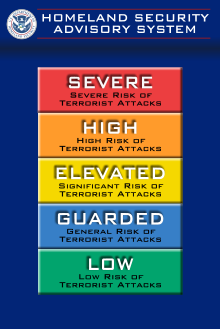Paranoia
Appearance


Paranoia is an instinct or thought process believed to be heavily influenced by anxiety or fear, often to the point of delusion and irrationality.
Quotes
[edit]- Paranoia is infectious. It’s also an incredibly useful tool. If you can make people afraid enough, uncertain enough, they will simply stop moving.
- C. L. Anderson, Bitter Angels (2009), Chapter 25
- In a captive environment, paranoia is unavoidable. Only the prison authorities call it paranoia; prisoners call it sensible precautions... Most prisoners are perfectly mentally healthy compared with the paranoia of prison officials.
- Ian Brady, as quoted in Evening Standard, Tue 25 June 2013, pp.1-4
- A paranoid man is a man who knows a little about what's going on.
- William S. Burroughs, quoted in Friend magazine (1970).
- In a world full of threat, it may be kind of beneficial for people to be on guard. It's good to be looking around and see who's following you and what's happening. Not everybody is trying to get you, but some people may be.
- Dennis Combs, "Are they out to get you? Paranoia on the rise". NBC News. 2008-12-11.
- "Some people have become so cynical that they don't believe in anything any more. In them, healthy scepticism has been replaced by a total breakdown in trust, the belief that everybody lies.
- Only the severe end was even considered. There was no sense of spectrum. Paranoia was very much seen as inexplicable, un-understandable, if anything some kind of biological system that had gone wrong. I remember thinking that seemed very reductionalist, that there must be some kind of psychology to it. Once I started looking at it as a spectrum, once you make the connection to things such as depression and anxiety, it really opens it up. People with depression have higher levels of paranoia because of a sense of vulnerability and low self-esteem.
Anxiety is linked too. But whereas anxiety may lead to fearing harm from a spider, or of being humiliated in a social situation, it doesn't lead to a belief that the spider or others intend to humiliate or hurt us. It's the attribution of intent that distinguishes paranoia. - This is another main reason why I believe paranoia is on the increase. Because we are constantly reminded, in the press, of threats from other people, we overestimate the chances of these events happening to us. There is a lot of research on this. It is what is known as the 'availability heuristic'. We make an estimate of the likelihood of a particular event simply by how easily we bring it to mind. Our children are getting fat because we aren't letting them out to play enough. We're scared they will be run over or abducted by strangers. In fact, the risks to the health from obesity are much higher than the risks of either of those events.
- David Freeman, "Suspicious minds" Sabine Durrant, The Guardian, (Mon 9, 2009).
- Paranoia all too often leads to isolation, unhappiness, and profound distress. But the exceptionally positive immediate results for the patients in this study show a new route forward in treatment. In just a thirty minute session, those who used the right psychological techniques showed major reductions in paranoia.
- David Freeman, "Oxford study finds virtual reality can help treat severe paranoia". University of Oxford. (2016-05-05).
- There is no sort of 'them and us', it is not that most people don't have paranoid thoughts and a few people have many, it seems that they are evenly distributed across the population, or many of us have them, much more than was previously thought.
And actually there is also evidence that societies that are perhaps more unequal, have less social cohesion, are all societies where there is a bit more suspicion in the general population. So paranoia certainly can be a problem for the individual, and I work in hospitals and see people who have severe experiences, but also it's perhaps the mark of the health of a society, the levels of mistrust within it. - I think in the paranoid spectrum it's quite clear that you're more likely to have paranoid thoughts if you're younger and if you live in cities or were raised in cities, for example. It also links to taking illicit substances such as cannabis. But as a psychologist what I'm particularly interested in is that people who tend to worry more, people who aren't sleeping so well, people who feel more miserable about themselves, are also more vulnerable to paranoid thoughts.
- David Freeman in "The psychology of paranoia - an emerging field", by Robyn Williams The Science Show, ABC, (10 December 2011).
- It's not paranoia if they're really after you.
- Tagline, Enemy of the State (1998).
- Just because you're paranoid
Don't mean they're not after you
- We are bombarded with information about our alert status and we're told to report suspicious-looking characters. That primes people to be more paranoid.
- David Penn, "Are they out to get you? Paranoia on the rise". NBC News. 2008-12-11
- Paranoia ain't the way to live your life from day to day, so leave your doubts and your fears behind.
- Justin Timberlake, "Space Cowboy" (2000), No Strings Attached, Jive Records
- Then I could turn around and justify that, by saying that it isn’t really paranoia if there really are people out to get you.
- Roger Zelazny, Isle of the Dead (1969), Chapter 1

